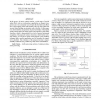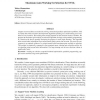93 search results - page 12 / 19 » Maximal Discrepancy for Support Vector Machines |
ICASSP
2009
IEEE
14 years 2 months ago
2009
IEEE
In the process of music content creation, a wide range of typical audio effects such as reverberation, equalization or dynamic compression are very commonly used. Despite the fact...
IJCNN
2008
IEEE
14 years 1 months ago
2008
IEEE
— We propose a feature selection criterion based on kernel discriminant analysis (KDA) for an -class problem, which finds eigenvectors on which the projected class data are loca...
ECML
2005
Springer
14 years 27 days ago
2005
Springer
Discriminative learning techniques for sequential data have proven to be more effective than generative models for named entity recognition, information extraction, and other task...
ESANN
2007
13 years 8 months ago
2007
Radial basis function network (RBF) kernels are widely used for support vector machines (SVMs). But for model selection of an SVM, we need to optimize the kernel parameter and the ...
JMLR
2006
13 years 7 months ago
2006
Support vector machines are trained by solving constrained quadratic optimization problems. This is usually done with an iterative decomposition algorithm operating on a small wor...


